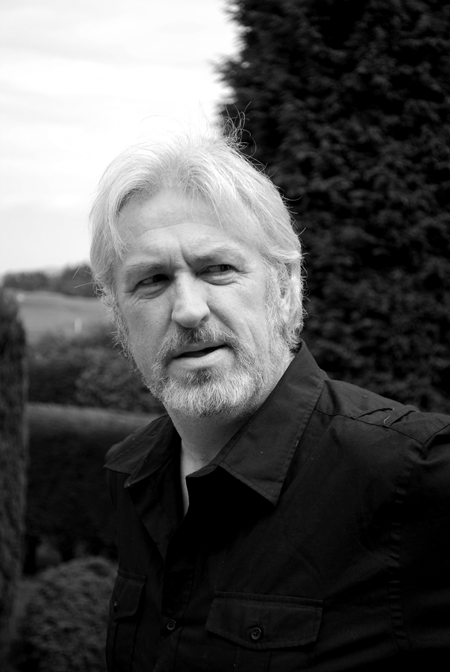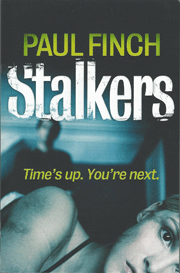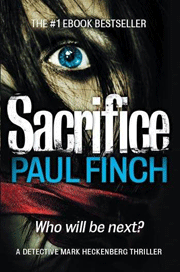Paul Finch is a screenwriter, novelist, short story writer, and journalist, whose published and broadcast work covers a wide spectrum of genres, including horror, fantasy, science fiction, thrillers, and crime.
 When my crime novel, Stalkers, was published by Avon Books (HarperCollins) in April this year, and the news followed shortly afterwards that a second novel in the same series, Sacrifice, will be published in July, people who knew me as a writer asked me why it was that I’d apparently switched from horror to thrillers.
When my crime novel, Stalkers, was published by Avon Books (HarperCollins) in April this year, and the news followed shortly afterwards that a second novel in the same series, Sacrifice, will be published in July, people who knew me as a writer asked me why it was that I’d apparently switched from horror to thrillers.
I suppose I should explain some of the background to that, and perhaps a little bit about myself. My name is Paul Finch and I’m a UK-based author with a working background in the police and journalism. My first professional credits were as a scriptwriter on the popular ITV crime series, The Bill, in the 1990s and early 2000s, though I’d first come to the attention of that programme in the late 1980s, after sending them unsolicited material in the hope I’d impress them with my word skills. In the end, what actually impressed them was my knowledge of police work. The word skills – which I guess were noticeably lacking around that time – were something they presumably thought they could teach me.
Anyway, that’s how it all began. I benefited enormously from my association with The Bill, learning my trade in what at the time was one of the best script departments in UK television.
However, while all this was going on, I had a parallel writing career in the fields of fantasy and horror. I’d always loved scary stories. Throughout my formative years I’d been schooled – as so many of my generation were – on Quatermass, Doctor Who, the Hammer movies and the writings of such ‘weirdest’ pioneers as Edgar Allan Poe, M.R. James and H.P. Lovecraft. In response to all that, I’d tried to pen a few spooky stories of my own, and for a while this ambition also bore fruit. I ended up selling hundreds of short stories to professional magazines and anthologies on both sides of the Atlantic, winning the British Fantasy Award twice (2002 and 2007), and the International Horror Guild Award (2007). Some of these stories were later optioned for movie development (Voodoo Dawn, 2000; Cape Wrath, 2002; The Belfries, 2004), while a couple of movies followed which I didn’t originate but was hired to work on as script-writer because I’d become a recognised name in the genre (Spirit Trap, 2005; The Devil’s Rock, 2011; and Dark Hollow – possibly in 2013). I also expanded my prose from the short story into the novella form, and from there into full-blown novels, my first one of which, Stronghold (2010), told the tale of a company of medieval English knights besieged in a Welsh castle by hordes of vengeful zombies, and enabled me to bring in another of my interests – historical themed action/adventure. The same thing happened with my next novel, Dark North (2012), which pitted one of King Arthur’s knights against a succession of demonic adversaries. Around this time, a door back to my childhood reopened when I took an option to write for Doctor Who, subsequently producing fouraudio dramas for Big Finish Productions: Leviathan (2010), Hexagora and Sentinels of the New Dawn (2011), Threshold (2012) and another Hunters’ Moon (2011).
All of that said, none of us ever stops developing – either in terms of our skills, our style or our personal interests. Though it wouldn’t have been true to say that around this time my horror/fantasy well was running dry, I was certainly starting to look further afield. Massively impressed by ‘cross-over’ movie thrillers like Se7en, Silence of the Lambs and The Girl With the Dragon Tattoo, I’d begun reading widely in hard-edged crime literature, and was knocked out by the work of Peter James, Stuart MacBride and Mark Billingham, who seemed able to incorporate the sort of devilishly dark themes I’d formerly associated only with horror into the ‘real world’ of mystery and suspense, while the raw, gritty action of Lee Child’s books left me speechless. I remember a recent chat I had with my agent, Julian Friedmann, in which we discussed this matter at length, and at the end of which we decided that, with The Bill now a thing of the past, I ought to utilise my police experience and my interest in urban evil to produce a brand new novel – a thriller, but with as dark and disturbing an angle as I could possibly create.
In reflection, it seems odd that I hadn’t written a crime novel before. I’d penned crime novellas – some of which are among my favourite pieces of work (Season of Mist, Walkers In The Dark and Hag Fold, all in 2010) – though all of these contained overt horror and supernatural elements. This new one had to be different, we decided – this one had to be an out-and-out crime story.
The result was Stalkers, which pits a dogged but intuitive detective against a band of murderous criminals whose methods are so revolting and whose reputation so fearsome that even the rest of the underworld avoids them.
 From the very beginning, I set out to make Stalkers as scary and suspenseful as possible, and to fill it with tough action and grittily realistic violence. Its hero is Detective Sergeant Mark ‘Heck’ Heckenburg; a Manchester cop transplanted to the Serial Crimes Unit at Scotland Yard, whose remit to hunt repeat offenders covers all the police areas of England and Wales. He is an experienced investigator who doesn’t suffer fools lightly, but who has a generally affable nature – apart from where his boss is concerned, Detective Superintendent Gemma Piper, a former girlfriend with whom he shares a deep if unspoken affection, but regularly clashes.
From the very beginning, I set out to make Stalkers as scary and suspenseful as possible, and to fill it with tough action and grittily realistic violence. Its hero is Detective Sergeant Mark ‘Heck’ Heckenburg; a Manchester cop transplanted to the Serial Crimes Unit at Scotland Yard, whose remit to hunt repeat offenders covers all the police areas of England and Wales. He is an experienced investigator who doesn’t suffer fools lightly, but who has a generally affable nature – apart from where his boss is concerned, Detective Superintendent Gemma Piper, a former girlfriend with whom he shares a deep if unspoken affection, but regularly clashes.
People who’ve read the book ask me who I based Heck upon. The only answer can be that he’s a combination of different people: an ultra hard-working DS of my personal acquaintance back during my own service, a guy who almost never went home; those intellectual crime-fighters who’ve populated British TV in recent years – Morse, Frost etc., old sweats who know the law inside out (along with every trick in the book); and then the more hardboiled kind of US cop hero, as typified by Popeye Doyle and Harry Callahan. Heck is certainly a good guy – there is nothing bent about him, but at the same time he’ll kick a hoodlum’s face in if there’s no other option.
Anyway, there isn’t much more I can say about Stalkers except that it all seemed to work splendidly. It sold over 100,000 copies in its first two months of publication. I don’t mean to boast in saying that; I mention it only to indicate that it seemed to hit the spot with its target audience. Most of the reviews it received were excellent, which pleased me no end – not least because it now means that more of the same will follow.
I can happily announce that Sacrifice, the follow-up to Stalkers, won’t be Heck’s last outing, though hopefully it will grab readers by the guts all over again. This will be another thriller that skates along the edge of horror. For various reasons, Heck had to go AWOL in Stalkers, but in Sacrifice he is back on the team – just as they are jolted into action by a series of murders apparently related to special dates on the calendar. For example, an old tramp dressed as Father Christmas is found walled into a chimney on Christmas Day morning; a courting couple are shot through their hearts by the same arrow while having sex in their parked car on Valentine’s Day, and so on. As the body count grows, so does the frenzied attention of the press, and so does the pressure on the team, until Heck’s colleagues are literally breaking around him.
 I always intended Sacrifice to be as much a character-study as an action thriller. Watching even tough police heroes struggling to interact normally and function effectively under such a terrible burden was almost as interesting to me as watching them chase the bad guys, though of course the chase is ultimately what it’s all about. Whereas Stalkers took us from London to Manchester to Kent, and back again, Sacrifice takes us from Liverpool to Yorkshire and then down into the Midlands. As before, I’ve gone out of my way to make it as tense as possible, and, if anything, have tried to raise the stakes when it comes to elaborate nastiness. I make no apologies for that. Not everyone will be comfortable in this dark world, but Heck is – and that’s all there is to it.
I always intended Sacrifice to be as much a character-study as an action thriller. Watching even tough police heroes struggling to interact normally and function effectively under such a terrible burden was almost as interesting to me as watching them chase the bad guys, though of course the chase is ultimately what it’s all about. Whereas Stalkers took us from London to Manchester to Kent, and back again, Sacrifice takes us from Liverpool to Yorkshire and then down into the Midlands. As before, I’ve gone out of my way to make it as tense as possible, and, if anything, have tried to raise the stakes when it comes to elaborate nastiness. I make no apologies for that. Not everyone will be comfortable in this dark world, but Heck is – and that’s all there is to it.
One other thing I perhaps should mention. Stalkers showed, I hope, that few characters in these books are safe. My regulars are just as likely to get the chop as my walk-on cast, and if not that, they could suffer life-changing injuries. And that’s the way it’s going to stay, I’m afraid; not just in Sacrifice, but in the other books to follow. So the message of that must be – like ’em, love ’em or loathe ’em, but don’t get too cosy with anyone.
The third book in the “Heck” series is called Hunted and is due to be published in February 2014. More information about Paul can be found on his blog. He can also be found on Facebook and you can follow him on Twitter @paulfinchauthor
medical abortion pill online
click here cytotec abortion pill buy online
i dreamed my husband cheated on me
click here website
free prescription drug discount card
damske.com cvs online coupon
diabetes mellitus treatment
site 10mg cialis dosage
cialis free sample coupons
click free prescription drug cards
losartan jubilant
go losartankalium bivirkninger
naprosyn 750 mg
click naprosyn jel nedir
ventolin prospecto
click ventolini cali
early abortion pill
acnc.com abortion pill